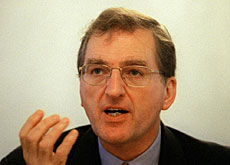Taking stock of the Earth summit

World leaders claim the Earth summit's global action plan will help reduce poverty and safeguard the world's natural resources.
But environmental groups say ten days of negotiations have produced little more than a statement of political rhetoric.
One of the chief Swiss negotiators in Johannesburg was Philippe Roch, who was appointed director of the Swiss Environment Agency back in 1992.
This was the year when the world first woke up to the call to save the planet at the original Earth summit in Rio de Janeiro.
Ten years on, swissinfo caught up with Roch just before world leaders packed their bags and headed home.
swissinfo: How does the World Summit on Sustainable Development compare to the original Earth summit in Rio?
Rio was much more innovative. It was really the founding moment of sustainable development. That said, today we talk much more about the social and economic, as well as environmental issues, which is a good thing. For a long time after Rio, sustainable development was confused with environmental protection, but … the environment is only one pillar of the whole. So the fact that we’ve had a bigger business presence here in Johannesburg is good news.
swissinfo: Are you concerned that the issue of biodiversity does not seem to have been given a top priority in Johannesburg?
I don’t think biodiversity has been forgotten. We have, for example, set a target for 2010 to reverse the loss of biodiversity, and this is a success. It was certainly not easy to get agreement on this, and the fact that we have is a reaffirmation of a very clear willingness to fight for biodiversity. I also have the impression that the world – including developing countries – has woken up to the fact that biodiversity is a central issue for sustainable development.
swissinfo: Do you have any regrets about the outcome of the summit?
I was already disappointed before the summit, because I knew that we would not decide on precise issues here. What we have achieved here is just a declaration, but it is still important. And the fact that many heads of state came to Johannesburg is a very important signal that they are willing to continue to work towards sustainable development.
swissinfo: Is this summit likely to be the last of its kind?
I don’t know. I really hope we will still have such summits, but I think that we should perhaps wait longer and have a real summit with commitments from all states. But it’s possible that the impetus for another summit could come in the future from what is happening in the field: more poverty, more climate disasters. It’s this kind of thing that could really act as a wake-up call for countries to organise a new Rio summit. But if it is just to produce papers, I don’t think we should have a new summit. We have to be ready to take new commitments to protect the environment, alleviate poverty and boost development.
swissinfo: Is there still the political will on the part of world leaders to negotiate on such a grand scale?
I don’t think the political will has disappeared forever. I think the real world will call upon us to have a new summit with new commitments. It was just not the right moment. That said, I think it was necessary to have this summit because of the loss of interest in the issue of sustainable development in many places and at the highest political level. That’s why Johannesburg has been useful, and I think we have come out with something important. But here in Johannesburg there are only beginnings and no conclusions.
swissinfo: Will people look back at this summit ten years from now in the same way that they look back today to Rio a decade ago?
I don’t think so. Rio was effectively the historical summit, and in ten years we will be looking back 20 years after Rio. Johannesburg is just a step – an important one – but it is not innovative and it’s not a summit that will really make its mark in history.
swissinfo: Do you have a sense that time is running out to do something about issues such as climate change and protecting biodiversity?
We are already much too late, and whatever happens we will lose a lot of species and see the degradation of our climate. The problem is that negotiations happen very slowly because of the political process that is very democratic and always looking for consensus. Switzerland is one of the countries, along with Norway and sometimes the European Union, which always asks for strong measures. But we have to have the others with us, otherwise we cannot do anything. And I repeat: we are already too late.
Interview: swissinfo, Ramsey Zarifeh, Johannesburg
Philippe Roch was appointed director of the Swiss Environment Agency in 1992.
He was one of the Swiss negotiators at the original Earth summit in Rio a decade ago.
The ten-day World Summit on Sustainable Development wrapped up with a political declaration and global action plan on Wednesday.

In compliance with the JTI standards
More: SWI swissinfo.ch certified by the Journalism Trust Initiative
You can find an overview of ongoing debates with our journalists here. Please join us!
If you want to start a conversation about a topic raised in this article or want to report factual errors, email us at english@swissinfo.ch.